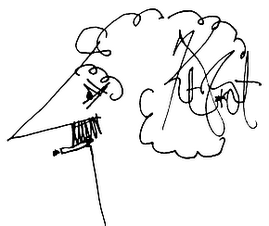This is an interview with a most observant reporter for the Globe and Mail. You'll enjoy it. I've linked to the larger piece.
Vonnegut wears a grey-green cardigan, tan slacks and white tennis shoes. He has long workman's hands, with fingers that are thick like dowels. In 1976, he described himself as having "the low-keyed amiability of an old family dog. In general his appearance is tousled: The long curly hair, mustache and sympathetic smile suggest a man at once amused and saddened by the world around him."
That description still holds true, though Vonnegut's face is now lined so sharply it could be a maquette for his own monument on Mount Rushmore. Something else: For decades, though he has been known variously as a science-fiction author, an experimental writer of postmodern narrative, and an essayist who has plumbed his own tragedies for material, many have seen him as following in Mark Twain's plainspoken humanist tradition. He gave his first-born, his only biological son, the name Mark. Now, Vonnegut bears a startling physical resemblance to Twain.
And like Twain, whom he once noted grew bitter toward the end of his life, Vonnegut is also more cynical than he has ever been. A Man Without a Country is shot through with despair for the Earth's poisoned fate and disappointment in the American body politic. Indeed, he says he considered an alternate title for the collection, The Fifty-First State, to evoke "the state of denial," which is, he says, America's natural state.
"I have a huge disappointment about what this country might have been instead of what it's become," he says. "You forget there was something great about the Great Depression. The president was Franklin Roosevelt, who cared generally about all of us. And things were getting better -- talk about audacity, giving women the power to vote, in 1919. It took a while for even women to adjust to it. Only now are they really getting the feeling of it. And then after the war when the civil-rights movement came in, that was exciting! So there were these huge improvements, where we were becoming what we always imagined ourselves to be. No shit, becoming that!"
But life is a series of cosmic disappointments and absurdities, which Vonnegut knows from first-hand experience. He saw his father's dreams of becoming a great architect foiled by fate and the Depression. His mother, who suffered from her own depression, killed herself on Mother's Day in 1944, when he was only 21. Nine months later, as a prisoner of war in Germany, he witnessed the firebombing of Dresden, which he later immortalized in Slaughterhouse-Five. His older sister Alice died of cancer at age 41, within 24 hours of her husband being killed in a train crash, leaving Vonnegut and his wife to adopt three of their children. After his son went off to British Columbia during the Vietnam War to start a commune, Mark went crazy and Vonnegut had to retrieve him and place him in an institution (which thankfully cured him). One of his daughters was briefly married to Geraldo Rivera. In the mid-1980s, Vonnegut himself attempted suicide, but failed. Who wouldn't see the world as a cosmic joke?
Even his own success is tinged with absurdity. "I never thought it was my destiny to be a writer. It just turned out it was the only way I could make a living," he says. "It was lucky that way, because I have survivor's syndrome, for a number of reasons. Obviously because of the firebombing of Dresden, but also all the really wonderful writers who've crashed and burned.
"I feel like a certain kind of horse's ass, like somebody born rich. I don't deserve it, and those who crashed and burned didn't deserve it, either. So I'm the asshole who broke the bank at Monte Carlo."
And he can't stop breaking the bank when he puts pen to paper. A Man Without a Country is on The New York Times extended bestseller list. But he's not sure its success means much of anything. "Nothing I can say can have any effect, except to say to somebody else, 'You're not alone.' That's as far as it goes," he says. "No political effect whatsoever." I remind him that his readers are clearly numerous and clearly hungry for anything he has to say. "Well, that's very nice, but it's politically meaningless. They have to have a majority, for God's sake." I tell him that, just because there wasn't a majority who voted against George W. Bush in the last election doesn't mean his words didn't have an effect; it just means they didn't have enough of an effect.
He pauses for a long time and then shakes his head dismissively. "I'm just the asshole who broke the bank at Monte Carlo," he replies, leaning back on his stock phrase.
And he'd just as soon have it all end. "I felt as I did when the Second World War ended: 'Please, I've done everything I'm supposed to do, can't I go home now?' " he says.
Enjoy the original
Sunday, May 27, 2007
Subscribe to:
Post Comments (Atom)


No comments:
Post a Comment